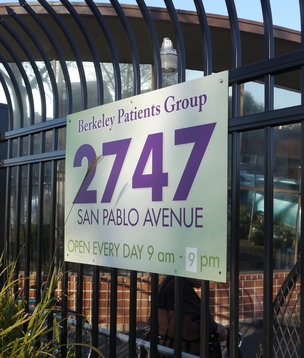Berkeley Patients Group’s owners declined to be interviewed for this story.
On its website, the group bills itself a “medical cannabis collective.” It also has a permit issued by Berkeley authorities.
In May, the group abruptly closed its storefront operation on San Pablo Avenue in Berkeley after federal prosecutors threatened to seize the property from the landlord, David Mayeri. In a letter to Mayeri, U.S. Attorney Melinda Haag cited violations of federal law and the dispensary’s proximity to two schools. Haag did not explicitly accuse Berkeley Patients Group of acting as a front for drug traffickers, and no criminal charges have been filed in the case.
Earlier this month the group announced it had launched a medical marijuana delivery service, but it’s unclear whether it will resume storefront sales in Berkeley.
Delivering medical marijuana to customers’ homes instead of selling it from a storefront could decrease federal pressure on Berkeley Patients Group. However, the group will likely face a significant drop in sales volume that will impact its large operating budget, designed to handle more than 10,000 members a month, according to interviews with former staff and industry experts.
Two of the best years for Berkeley Patients Group were 2008 and 2009, when it recorded $17.4 million and $16.4 million respectively in total income from the distribution of marijuana buds, edible products infused with pot, as well as seeds, clones and other items (company discounts reduced the actual figures by $1.1 million in 2008 and $1.3 million in 2009). According to company documents, the cost for goods sold was about $10 million in 2008 and $9 million in 2009, leaving a gross profit margin close to 40 percent.
The biggest portion of the group’s operating expenses went to labor costs, which totaled $3.3 million in 2009, including more than $911,00 paid to co-directors Deborah Goldsberry, Etienne Fontan and Tim Schick.
Berkeley Patients Group’s former bookkeeper, Doug McVay, said salaries for top executives were increased by as much as 50 percent in 2009, and that total compensation figures detailed in the documents reflected generous bonuses.
“It was a lot of money,” he said, noting that salaries for other staff were also raised. "Employees were treated quite well."
State medical marijuana laws do not require dispensary operators to disclose salaries of any employees. Executives at Berkeley Patients Group and Harborside Health Center, a large dispensary based in Oakland, have repeatedly refused to publicly reveal compensation packages or report them to local authorities.
“Because BPG is a private company, it does not disclose salaries or other sensitive financial information to the public,” Berkeley Patients Group said in a written statement earlier this year, adding that compensation levels were in line with “other medical non-profits of our size in the Bay Area.”
Allison Margolin, a Los Angeles defense attorney who has represented more than 70 dispensaries, said Berkeley Patients Group’s salaries looked fair and the books seemed to be in order.
Margolin said successful marijuana operators were justified in measuring themselves against other nonprofits of comparable size. “Executives of nonprofits can make millions of dollars – hospitals are nonprofits," she said. "I think it's reasonable for dispensary executives to make millions, too, considering the risk and myriad skills involved.”
In addition, she said the company’s finances could help explain why medical marijuana costs as much as $60 for an eighth of an ounce in California, which is similar to the cost on the black market. There's the cost of inventory, plus an endless list of expenses including insurance, attorney and accountant fees and advertising.
“The truth is, if dispensaries weren't charging market prices they'd be out of business,” she said, adding that the constant threat of robberies and police raids raised the cost of doing business.
Berkeley Patients Group spent $151,789 for security in 2009.
One area where the dispensary appears to fall short of its public rhetoric is in its donations to local charities. While company executives have said they contribute generously to groups ranging from local libraries and schools to the Berkeley Chamber of Commerce, internal documents show the group gave $18,083 to charity in 2009. In contrast, it distributed $253,433 to marijuana advocacy organizations.
Over the past year, Berkeley Patients Group has faced a series of legal and financial challenges. According to a 2011 state audit, the group owed $6.4 million to the California State Board of Equalization for its failure to pay sales taxes from 2004 to 2007. Company officials have said they are paying off the debt in monthly installments.
In addition, former co-owner Deborah Goldsberry filed a wrongful termination complaint last year accusing company directors of illegally funneling more than half a million dollars to finance four dispensaries in Maine. Her complaint was settled in January. A separate lawsuit over the Maine project was settled earlier this month.

